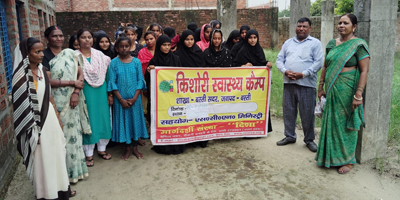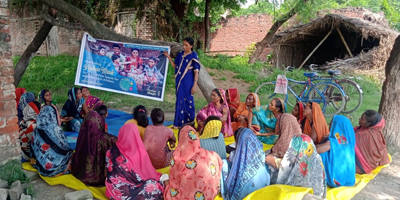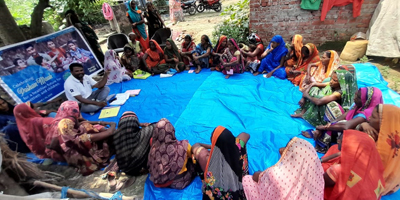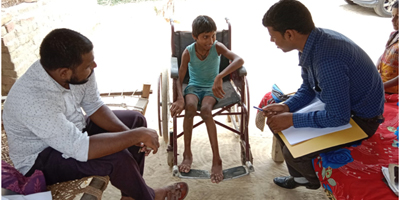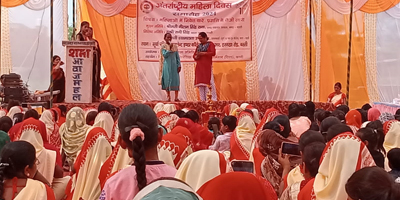 We see the emergence of many Voluntary Organizations - some say it is a mushroom growth - to share the responsibilities of Nation Building, through empowerment of the disadvantaged and the marginalized sections and their capacity building exercises. We also experience in our country a very lopsided and staggering growth of the rural as well as the socially and economically deprived people. Even after years of independence and planned development activities, the fruits of the efforts did not trickle down and disseminate to these poor. The quality of life of the poor remains stagnant without any steady improvement.
We see the emergence of many Voluntary Organizations - some say it is a mushroom growth - to share the responsibilities of Nation Building, through empowerment of the disadvantaged and the marginalized sections and their capacity building exercises. We also experience in our country a very lopsided and staggering growth of the rural as well as the socially and economically deprived people. Even after years of independence and planned development activities, the fruits of the efforts did not trickle down and disseminate to these poor. The quality of life of the poor remains stagnant without any steady improvement.
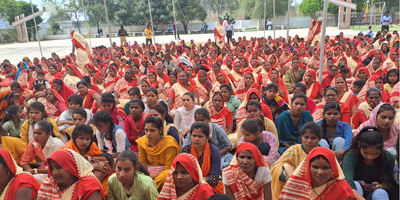 The magnitude of the problems and challenges the Voluntary Organizations address in the rural areas are so vast that the effect is very insignificant and slow. Hence there is the need for both extensive and intensive interventions in the lives of the poor and the marginalized. We need a multiplication of helping hands and broader shoulders to collaborate and share the responsibilities of integrated, participatory and sustainable development and empowerment processes of the poor and the marginalized. All are called to contribute, according to their capacities, and share the responsibilities of community building processes, even if it is very meagre. As Rabindranath Tagore puts it, "there are numerous strings in your lute; let me add my own among them" so that "into that haven of freedom, o Lord, let my country awake."
The magnitude of the problems and challenges the Voluntary Organizations address in the rural areas are so vast that the effect is very insignificant and slow. Hence there is the need for both extensive and intensive interventions in the lives of the poor and the marginalized. We need a multiplication of helping hands and broader shoulders to collaborate and share the responsibilities of integrated, participatory and sustainable development and empowerment processes of the poor and the marginalized. All are called to contribute, according to their capacities, and share the responsibilities of community building processes, even if it is very meagre. As Rabindranath Tagore puts it, "there are numerous strings in your lute; let me add my own among them" so that "into that haven of freedom, o Lord, let my country awake."
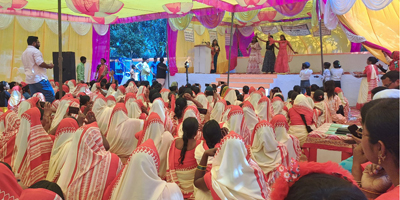 We share the same goal of visionaries, forefathers and the development planners of our country. UNICEF envisions: "The day will come when Uttar Pradesh will be judged not by the military or economic strength nor by the splendour of its capital cities and public buildings but by the wellbeing of its people; by their levels of health, nutrition and education; by the opportunities to earn a fair reward for their labor; by the ability to participate in the decisions that effect their lives; by the respect that is shown for their civil and political liberties; by the provision that is made for those who are vulnerable and disadvantaged; and by the protection that is afforded to the growing minds and bodies of their children."
We share the same goal of visionaries, forefathers and the development planners of our country. UNICEF envisions: "The day will come when Uttar Pradesh will be judged not by the military or economic strength nor by the splendour of its capital cities and public buildings but by the wellbeing of its people; by their levels of health, nutrition and education; by the opportunities to earn a fair reward for their labor; by the ability to participate in the decisions that effect their lives; by the respect that is shown for their civil and political liberties; by the provision that is made for those who are vulnerable and disadvantaged; and by the protection that is afforded to the growing minds and bodies of their children."
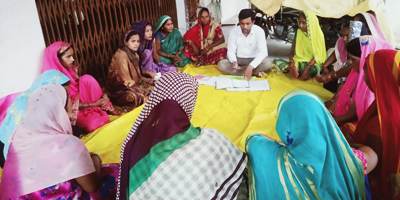 The CST (Congregation of St. Therese) Fathers of the Little Flower Congregation, who were working in the Districts of Eastern Uttar Pradesh since 1970 and were developing the Diocese of Gorakhpur, felt the need of a new Registered Charitable Organization to coordinate various rural development activities and reach out to the most marginalized and excluded sections. On 24 September 2001 Development Initiatives by Social Animation (DISA) was registered, under the Society's Registration Act of 1860. The area of operation of the DISA is Whole of India. The experiences of the promoters of DISA count much in translating the dreams for an ideal society and we take initiatives, following their footprints. We join with Mother Teresa to say: "We ourselves feel that what we are doing is just a drop in the ocean but the ocean would be less because of that missing drop."
The CST (Congregation of St. Therese) Fathers of the Little Flower Congregation, who were working in the Districts of Eastern Uttar Pradesh since 1970 and were developing the Diocese of Gorakhpur, felt the need of a new Registered Charitable Organization to coordinate various rural development activities and reach out to the most marginalized and excluded sections. On 24 September 2001 Development Initiatives by Social Animation (DISA) was registered, under the Society's Registration Act of 1860. The area of operation of the DISA is Whole of India. The experiences of the promoters of DISA count much in translating the dreams for an ideal society and we take initiatives, following their footprints. We join with Mother Teresa to say: "We ourselves feel that what we are doing is just a drop in the ocean but the ocean would be less because of that missing drop."
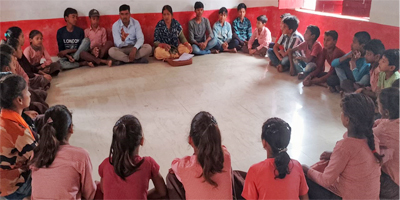 DISA views that the present Society is not an ideal Society as visualized in the Constitution of India, though considerable progress has been made in all the fields over a period of many years, after Independence. There is rampant corruption, exploitation, exclusion, violation of human rights and gross discrimination of the weaker sections of the Society. They are the “Little Ones”, who are cut off from the main stream and are pushed to the peripheries of the Society. Restoring their dignity and upholding their rights so that they enjoy the constitutional safeguards, shall be the means to create a new social order of human communities, where the universal values of justice, fraternity, equity, love, peace etc. will reign supreme. We believe that another world is possible, where all shall have their due share in the community and access to the resources of this country. Hence DISA sets the goal of bringing a social transformation with structural and systemic changes that the new order is integrated, participatory, inclusive and sustainable.
DISA views that the present Society is not an ideal Society as visualized in the Constitution of India, though considerable progress has been made in all the fields over a period of many years, after Independence. There is rampant corruption, exploitation, exclusion, violation of human rights and gross discrimination of the weaker sections of the Society. They are the “Little Ones”, who are cut off from the main stream and are pushed to the peripheries of the Society. Restoring their dignity and upholding their rights so that they enjoy the constitutional safeguards, shall be the means to create a new social order of human communities, where the universal values of justice, fraternity, equity, love, peace etc. will reign supreme. We believe that another world is possible, where all shall have their due share in the community and access to the resources of this country. Hence DISA sets the goal of bringing a social transformation with structural and systemic changes that the new order is integrated, participatory, inclusive and sustainable.
